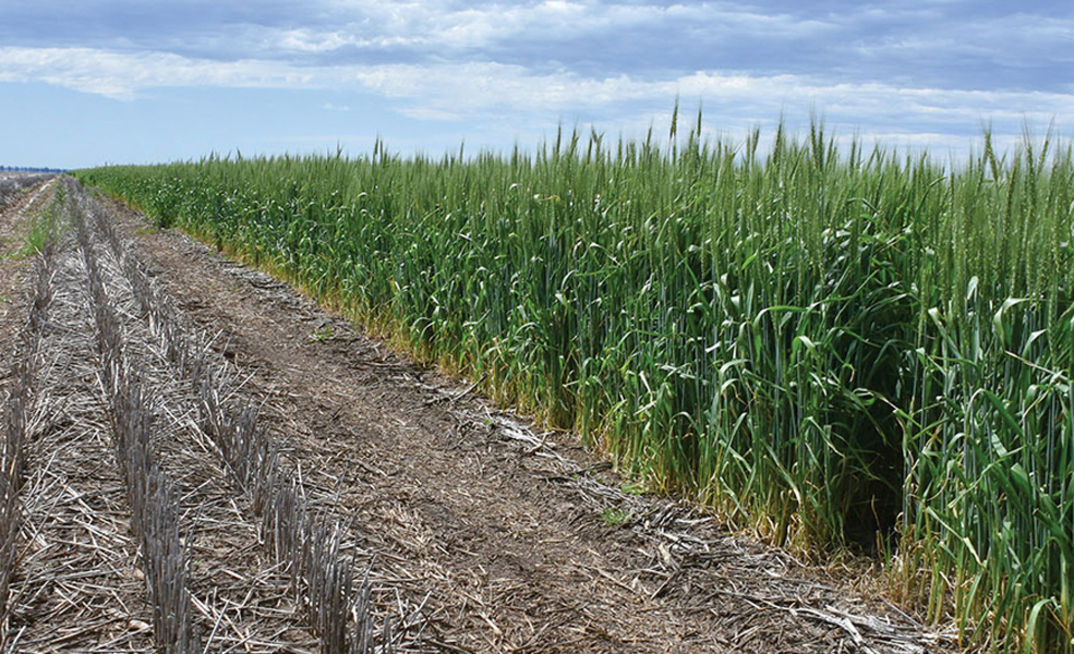Improved agronomics and genetics over recent years has meant we are producing larger yields that require more inputs of both water and nutrients, and this places higher demands on our soils.
We add the required nutrients via synthetic fertilisers but neglect the critical aspect of what's happening with our soil biology.
A key component to soil health and achieving high yields is being aware of the beneficial microbial life in our soils and ensuring the most beneficial species are present at adequate levels.
One important factor that growers should be aware of is that the majority of grain crops and cotton are what is called mycorrhizal, which means they rely significantly on the relationship they have with soil based beneficial fungi called mycorrhizae to grow to their full potential.
Native mycorrhizae species are present in most soils although cropping practices often result in their levels being severely reduced, which can limit the crops ability to achieve its full potential.
The use of fallow and long fallow periods for building soil moisture combined with wetting and drying cycles through these periods severely depletes the level of mycorrhizae in the soil.
Because mycorrhizae require a living host to sustain itself in the soil, these periods of fallow mean its levels quickly drop and take some time to build up again to adequate levels.
Other ways these beneficial fungi can be removed from the system is by growing non-mycorrhizal crops like canola and lupins and through cultivating the soil.
Mycorrhizae increases the health and improves the growth of crops by colonising the roots and extending vast networks of hyphae well beyond where the root themselves finish. This helps the plant forage for and access soil nutrients and moisture that are otherwise inaccessible to the crop.
Eighty per cent of agricultural crops form a bond with mycorrhizae and farmers should be aware that ensuring crops have adequate mycorrhizae in the soil will help maximise their growth.
Another benefit of ensuring crops have a strong colonisation of mycorrhizae is the ability to maximise the efficient capture and uptake of applied fertiliser.
Farmers invest significant dollars on synthetic fertilisers and a strong network of mycorrhizae in the soil will ensure that the uptake of these nutrients is maximised and their leeching outside the rootzone is minimised.
Mycorrhizae also help with overall soil health by secreting a carbon rich glue-like substance known as glomalin that over time helps build soil structure, increases organic carbon percentage and overall soil health.
Until recently, the technology to produce high quality, concentrated, easy to use and cost-effective mycorrhizae inoculants hasn't been available.
Unlike their rhizobium bacterial inoculant cousins that get applied to legume crops and pastures, mycorrhizae have proved more difficult to develop into similarly successful inoculants.
Until now. Sumitomo Agrosolutions, over recent years has focused considerable efforts into producing high quality, highly useable and affordable mycorrhizae inoculants for use in a range of crops.
Sumitomo brings considerable experience with biological products, being the first company to develop Bt insecticides decades ago with brands like Dipel and XenTari, among others.
Sumitomo now has a new highly concentrated liquid mycorrhizae inoculant called EndoFuse that can be easily applied to planting seed or in-furrow with a rate range as low as 10-15 mL per ha and mixed with rhizobium inoculants at equivalent rates when treating grain legumes or legume pastures.
Given the yield and quality improvements that have been seen in recent trials, the relatively low cost per hectare of EndoFuse provides an excellent return of investment, especially when you factor in that you are also building your long-term soil health.
In recent trials conducted across the key broadacre cropping zones of Australia EndoFuse-inoculated crops have shown excellent improvements to yield and quality in a range of crops and particular benefits have been noted with improved resilience in the face of key stress factors such as moisture stress.
ABOUT THIS COMPANY
Sumitomo
Modern agricultural practices, particularly in our broadacre grain and cotton production systems are often detrimental to key aspects of soil health.
HEAD OFFICE:
- 5/51 Rawson St, Epping, NSW, 2121, Australia
- Website: www.sumitomo-chem.com.au/
- Email: orders@sumitomo-chem.com.au
- Phone: 287529000
























